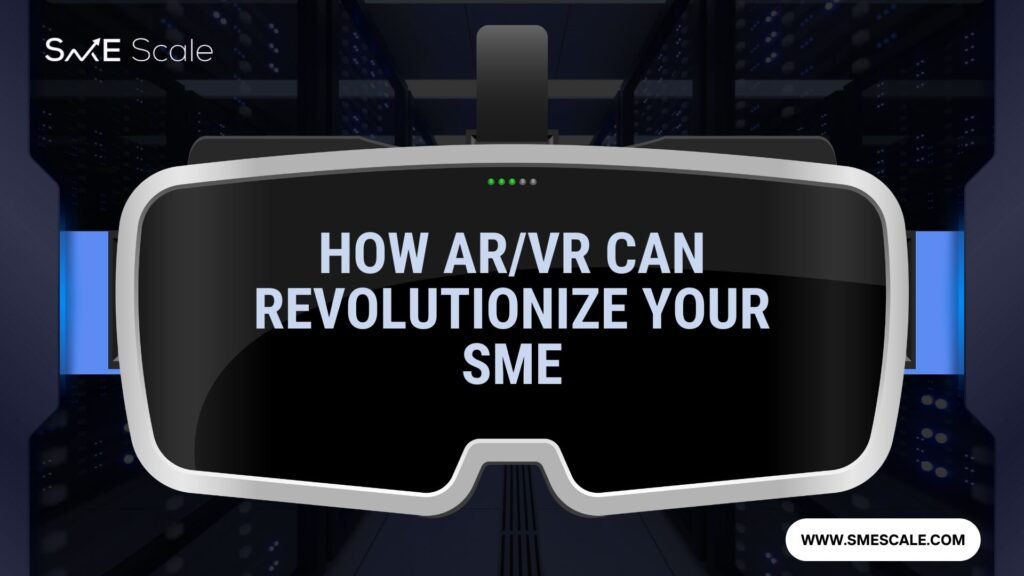
Augmented Reality (AR) and Virtual Reality (VR) technologies are no longer exclusive to big corporations or the gaming industry. These immersive technologies are transforming the way businesses engage with customers, train employees, and enhance operations. For small and medium-sized enterprises (SMEs), adopting AR/VR can create unique opportunities to differentiate themselves, boost customer experience, and drive growth.
This blog explores how AR/VR can revolutionize SMEs, the psychology behind their effectiveness, and provides a real-life case study showcasing how a business successfully implemented these technologies.
What Are AR and VR?
Augmented Reality (AR): Enhances the real-world environment with digital overlays, such as graphics, sounds, or haptic feedback.
Virtual Reality (VR): Creates an entirely immersive digital environment, allowing users to interact within a simulated world.
Why AR/VR Matters for SMEs
Enhanced Customer Engagement:
AR/VR allows businesses to offer interactive and engaging experiences, increasing customer satisfaction and loyalty.
Improved Training and Operations:
SMEs can use VR simulations for employee training, reducing costs and improving learning outcomes.
Product Visualization:
AR enables customers to visualize products in their own space before purchase, boosting confidence and reducing returns.
Differentiation:
AR/VR adoption sets SMEs apart from competitors, positioning them as innovative and forward-thinking.
Scalability:
With decreasing costs of AR/VR hardware and software, these technologies are becoming more accessible for SMEs.
The Psychology Behind AR/VR
The effectiveness of AR/VR in business lies in key psychological principles:
Immersion:
Immersive experiences create stronger emotional connections, making interactions more memorable and impactful.
Interactivity:
Engaging directly with products or environments through AR/VR increases perceived value and customer satisfaction.
Novelty Effect:
AR/VR’s uniqueness captures attention and curiosity, driving higher engagement rates.
Cognitive Ease:
AR simplifies complex concepts by providing visual explanations, reducing cognitive load and increasing comprehension.
How SMEs Can Use AR/VR
Interactive Marketing Campaigns:
Use AR to create interactive ads where customers can try products virtually.
Develop VR experiences to tell your brand story in a memorable way.
Virtual Product Demos:
Allow customers to explore products in a VR showroom.
Use AR to show how furniture, clothing, or accessories look in real-life settings.
Employee Training:
Conduct VR-based training sessions for complex or hazardous tasks, improving safety and knowledge retention.
Customer Service:
Offer AR-based troubleshooting or guided instructions for products.
Event and Trade Show Engagement:
Use VR to showcase your offerings at trade shows or AR to create interactive displays.
Real-Life Case Study: GreenScape Garden Supplies
Background:
GreenScape Garden Supplies, an SME specializing in sustainable gardening products, struggled to compete with larger chains offering lower prices and extensive product lines. To differentiate themselves, they decided to integrate AR into their marketing strategy.
Solution:
AR Product Visualizer:
SME Scale helped GreenScape develop an AR app that allowed customers to visualize how garden plants, furniture, and landscaping elements would look in their spaces before purchasing.
Interactive Marketing Campaign:
GreenScape launched a campaign inviting customers to use the AR app to design their dream garden, offering discounts for completed designs shared on social media.
Virtual Storefront:
They created a VR tour of their store, allowing customers to browse inventory remotely and interact with staff virtually.
Employee Training:
VR simulations trained staff on plant care and customer service techniques, improving both efficiency and expertise.
Results:
Increased Sales: Revenue grew by 40%, driven by higher conversion rates from customers using the AR app.
Social Media Engagement: User-generated content from the campaign boosted GreenScape’s Instagram following by 30%.
Improved Customer Satisfaction: Customers appreciated the ability to visualize products, with 85% reporting a more confident buying decision.
Key Takeaway:
By leveraging AR and VR technologies, GreenScape not only enhanced customer engagement but also differentiated themselves from competitors and streamlined operations.
How SME Scale Can Help
Implementing AR/VR technologies may seem daunting, but SME Scale offers tailored solutions to make the process seamless:
Technology Integration: Develop AR/VR tools customized to your business needs.
Content Creation: Create immersive experiences that captivate your audience.
Employee Training: Train your team to use AR/VR effectively.
Marketing Strategies: Design campaigns that highlight the innovative use of AR/VR.
Conclusion
AR and VR technologies are no longer reserved for large corporations or high-tech industries. SMEs can harness these tools to elevate customer experiences, improve operations, and gain a competitive edge. The case of GreenScape Garden Supplies demonstrates how even small businesses can implement AR/VR effectively and see significant results.
Ready to revolutionize your SME with AR/VR? Visit SME Scale to learn how their expertise can help you unlock the full potential of these transformative technologies.

